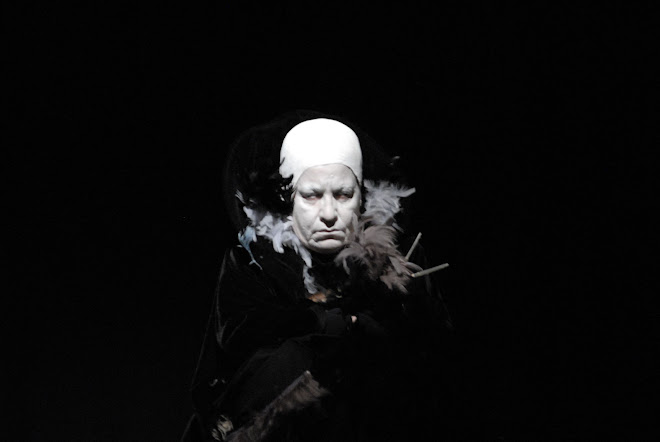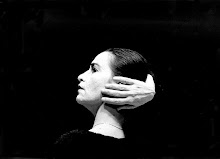
The theatre of Silence (mime) is an international theatrical genre. The absence of speech and the easily recognizable body language that is common to all people, as well as the condensed time can give to the theatrical pantomime the place that poetry possesses within literature. I apprenticed with Marcel Marceau, the great mime and teacher. The visibility of the invisible world the Marceau creates is an undeniable fact. He urged me (because of mime's Greek origin*, and mine also!) to create my own language of mime. I managed to do this, when I finally felt more mature as a theatrical actress of prose. Thus, the Theatre of Silence was born in 1993. In my first performance, (Medea of Silence), I experimented on my own and on myself, trying to express with the body's language the deeper feelings of the myth's heroine. Later on, through a course of seminars, in which I started to apply my new 'mimical' method, I chose a group of actors which I used in the Theatre of Silence performances. Mime is the Art that makes the visible world, invisible. And by the word 'world' I don't just mean the world of object, but also the soul's invisible world , the world of big and small emotions. Mime is the Art that allows those things that cannot be said with words, to be expressed with the language of Silence. It is the Art that makes the gaze, the fingers and the toes, the wrists and the ankles, the face's muscles and breathing have their own entity, which is almost independent from the rest of the body. I believe that every actor is a mime, with the deep meaning of the word, by the nature of his/her art. According to Aristotle, tragedy, is 'the imitation (mimesis) of an action that is serious and also, as having magnitude, complete in itself; in language with pleasurable accessories, each kind brought in separately, in the parts of the work; in a dramatic, not in a narrative form; with incidents arousing pity and fear, wherewith to accomplish its catharsis of such emotions'. Since all humans' primordial movements and emotions are innate and as these contribute to the everyday existence (thinking, walking, running, waiting, laughing, hurting, crying, falling in love, being afraid, etc.), the actor using the body's memory and the emotional memory that he has been trained to have, re-enacts-imitates these movements and emotions thus constituting the theatrical praxis.
Aspasia Kralli
* The Art of Mime is an ancient Greek and was born in Greece several years before the Ancient Drama. The ancient Greek mimes re-enacted myths, on which the great Greek poets of Greek Drama (Aeschylus, Sophocles, and Euripides) were, based their plays later on. Relevant Bibliography:
- 'Mime and Mimes' by Marios Ploritis, Kastaniotis Publications
- 'Saint Bacchus' by Alexis Solomos, Dodoni Publications
Love Bites (2002-2003) Ex Machina Theatre

This is the story of nine young people living in a seaside village where love seduces, enchants, disappoints, brings joy and... bites. Aspasia Kralli, having as a starting point Can Themba's (African writer) 'The costume', created along with her actors/students a story without words but otherwise very conversational and communicative as to the situations and the feelings, filled with music of all kinds leading the performance to a climax.
Naughty Class (2000-2001) Ex Machina Theatre

Pentheus Suffering (1996-97-98) Ex Machina Theatre

Agavi (leader of the Bacchantes) educates her son, Pentheus, with very strict and conservative principles. Consequently, he can't accept Dionysus, god of life and pleasure. Dionysus gets angry and leads Agavi to a bacchic state in order to kill Pentheus, her son. The sacramental bacchic ritual is reenacted in a very impressive and inventive way in this performance. This play was a great success and was praised by the critics and was thus performed for two full consecutive theatrical seasons.
Hades in a Room (1994-95) Theatre Embros

This play follows Orpheus' and Eurydice's course, from the beginning of their love, to Eurydice's death, then to Orpheus' descent to Hades whose forbidden look behind him and his intolerance led him to his self-destruction namely the final death of Eurydice and his absolute misery. The god Hermes interferes in all this by quipping the heroes or by leading them to their destiny.
Medea of Silence (1992-93) Theatre Studio Ilisia

This play refers to Medea, the brutal solitude of love, birth and revenge. It is a play for one actress, several objects (which have the equivalent size relevance as in Alice in Wonderland) and a mask. The play was performed for two consecutive years due to the public's intense display of interest for this debutant genre at that time in contemporary Greece.


2 comments:
ΑΓΑΠΗΜΕΝΗ ΑΣΠΑΣΙΑ!ΦΑΙΝΕΤΑΙ ΕΞΑΙΡΕΤΙΚΑ ΕΝΔΙΑΦΕΡΟΥΣΑ Η ΠΑΡΑΣΤΑΣΗ! ΑΝΥΠΟΜΟΝΟΥΜΕ ΝΑ ΤΗΝ ΔΟΥΜΕ!
Περιμένουμε αγωνιωδώς indeed!
Καλό υπόλοιπο προετοιμασίας:)
Post a Comment